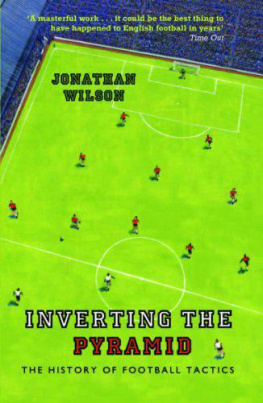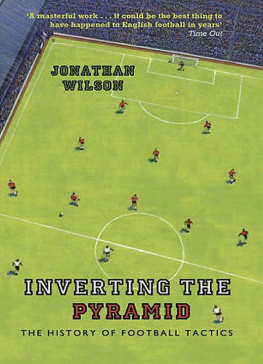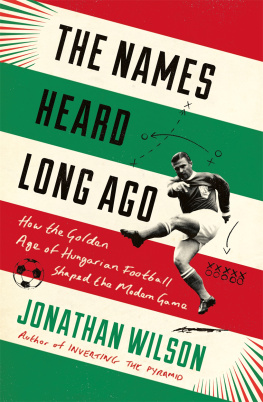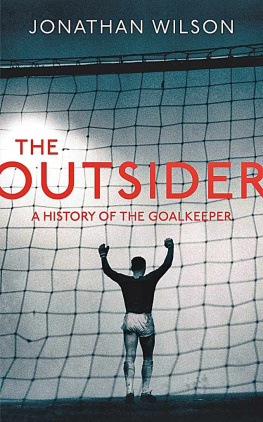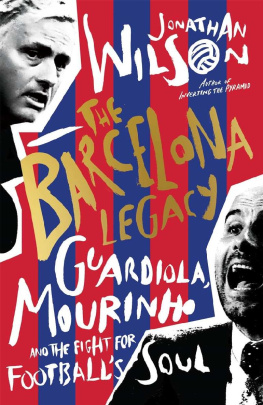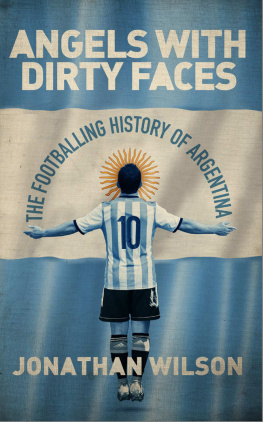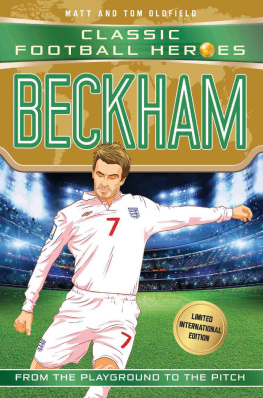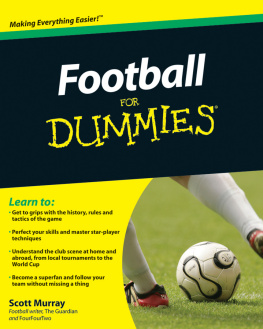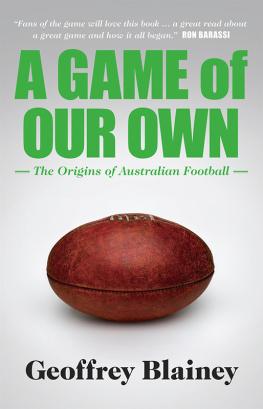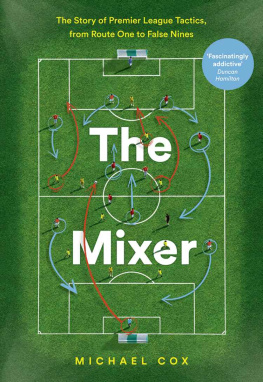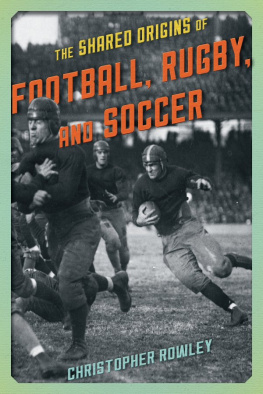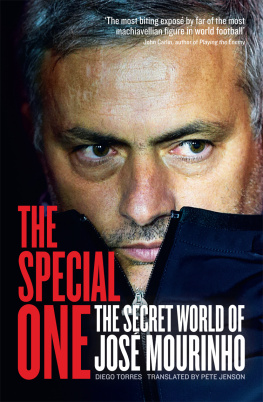Jonathan Wilson is the football correspondent for the Financial Times , and writes for the Sunday Telegraph . He is a columnist for guardian.co.uk and the Japanese magazine World Soccer King , and his work has appeared in the Independent , Independent on Sunday , the Daily Telegraph , Scotland on Sunday , the Sunday Herald , FourFourTwo , Champions and When Saturday Comes . Behind the Curtain : Travels in Eastern European Football , was Jonathan Wilsons critically acclaimed first book. Inverting the Pyramid was shortlisted for the William Hill Book of the Year and won the British Sports Books Awards Football Book of the Year.
Inverting the Pyramid
JONATHAN WILSON
www.orionbooks.co.uk
AN ORION EBOOK
First published in Great Britain in 2008 by Orion
This ebook first published in 2010 by Orion Books
Copyright Jonathan Wilson 2008
The moral right of Jonathan Wilson to be identified as the author
of this work has been asserted in accordance with the
Copyright, Designs and Patents Act 1988.
All rights reserved. No part of this publication may be reproduced, stored in a retrieval system or transmitted
in any form or by any means, without the prior permission in writing of the publisher, nor to be otherwise
circulated in any form of binding or cover other than that in which it is published without a similar
condition, including this condition, being imposed on the subsequent purchaser.
A CIP catalogue record for this book
is available from the British Library.
eISBN : 978 1 4091 1111 5
This ebook produced by Jouve, France
The Orion Publishing Group Ltd
Orion House
5 Upper Saint Martins Lane
London WC2H 9EA
An Hachette UK Company
www.orionbooks.co.uk

Acknowledgements
In writing this, I have been humbled by just how generous so many people have been with their time and thoughts. This is a long list, but that should not diminish how vital a role each of the people included in it played.
In Ukraine, Hungary and Russia, my thanks to Taras Hordiyenko, Sndor Laczk and Vladimir Soldatkin, who were as enlightening and thorough as ever. Thanks also to Aliaksiy Zyl and his coterie of Dinamo fans in Minsk for their advice (and thanks to Chris Fraser for introducing us. Dima: the polonium night at the Emirates will never be forgotten).
In Argentina, my thanks to Marcela Mora y Araujo for introducing me to her vast circle of friends, to Rodrigo Orihuela, Fderico Mayol, Neil Clack and Klaus Gallo for their help in setting up interviews, translating, research and ferrying me around, and to Araceli Alemn for opening up her vast library of material, the regular disquisitions on the superiority of Juan Romn Riquelme to, well, everything, and, of course, the extended walking tour.
In Brazil, my thanks to Ivan Soter, Roberto Assaf, Paulo milio and Alberto Helena Junior for sharing their time and learning so freely, to Cassiano Gobbet, Robert Shaw and Jordana Alvarez dos Santos for their efforts in research, translation and logistics, and also to Aidan Hamilton and Alex Bellos, for sketching out the background and putting me in touch with experts on the ground.
Thanks to Gabriele Marcotti for all his assistance with the Italian sections, for being such an informed and robust sounding-board, but most particularly for allowing me finally to participate in one of those restaurant debates in which bowls of hummus, tabouleh and tzatziki become the Udinese defence. Id still like my time-share on the quiz trophy, though.
Thanks to Philippe Auclair for his help in France, to Christoph Biermann, Raphael Honigstein and Uli Hesse-Lichtenberger for their assistance with all matters German, to Simon Kuper and Auke Kok for their words of wisdom on Dutch football, and to Sid Lowe and Guillem Balagu for their advice on Spain. Thanks also to Brian Glanville for his unfailing generosity of spirit and for putting me right on a number of historical matters.
Thanks to Richard McBrearty of the Scottish Football Museum at Hampden and Peter Horne at the National Football Museum in Preston for sharing their expertise in the origins of football, and to the staff of the British Library at St Pancras, the Mitchell Library in Glasgow and the British Newspaper Library at Colindale.
Thanks also, for their various help in reading over sections of the manuscript, translation, and suggesting avenues of research to: Jon Adams, David Barber, Maurcio Ribeiro Barros, Hanspeter Born, Duncan Castles, Marcus Christenson, James Copnall, Graham Curry, Sorin Dumitrescu, Dave Farrar, Igor Goldes, Luke Gosset, Gavin Hamilton, Georg Heitz, Paul Howarth, Emil Ianchev, Maciej Iwanski, Richard Jolly, John Keith, Thomas Knellwolf, Jim Lawton, Andy Lyons, Ben Lyttleton, Dan Magnowski, Emma McAllister, Kevin McCarra, Rachel Nicholson, Vladimir Novak, Gunnar Persson, Andy Rose, Paul Rowan, Ljiljana Ruzi, Milena Ruzi, Dominic Sandbrook, John Schumacher, Hugh Sleight, Rob Smyth, Graham Spiers, Gyrgy Szepesi, Eric Weil, Duncan White, Axel Vartanyan, Shinobu Yamanaka and Bruno Ziauddin.
Thanks to my agent, David Luxton, and my editor at Orion, Ian Preece, for their unflagging support and helpful interventions, and to the copy-editor, Chris Hawkes, for his diligence.
And thanks, finally, to Ian Hawkey for spending so much of the Cup of Nations sharing his expertise in matters of punctuation, and to Network Rail for the points failure that led to the long wait just north of Durham during which the flaw in Reeps theory became apparent to me.
felix qui potuit rerum cognoscere causas*
Virgil, Georgics, no 2, l 490
(* Fortunate is he who can understand the causes of things.)

Prologue
A tapas bar in the Bairro Alto in Lisbon, the evening after England beat Switzerland 3-0 in Euro 2004. The rioja had been flowing, and a multi-national group of journalists was discussing whether Sven-Gran Eriksson had been right to stick with an orthodox 4-4-2, or if, as it had been suggested he would, he should have switched to a midfield diamond. Had player-power, a late-night delegation of midfielders, forced the unexpected reversion to the flat four in midfield?
Oh, whats the difference? an English colleague protested. Theyre the same players. The formation isnt important. Its not worth writing about.
There was a splutter of indignation. As I raised a drunken finger to jab home my belief that people like him shouldnt be allowed to watch football, let alone talk about it, an Argentinian, probably wisely, pulled my arm down. The formation is the only thing thats important, she said. Its not worth writing about anything else.
And there, in a moment, was laid bare the prime deficiency of the English game. Football is not about players, or at least not just about players; it is about shape and about space, about the intelligent deployment of players, and their movement within that deployment. (I should, perhaps, make clear that by tactics I mean a combination of formation and style: one 4-4-2 can be as different from another as Steve Stone from Ronaldinho). The Argentinian was, I hope, exaggerating for effect, for heart, soul, effort, desire, strength, power, speed, passion and skill all play their parts, but, for all that, there is also a theoretical dimension, and, as in other disciplines, the English have, on the whole, proved themselves unwilling to grapple with the abstract.

